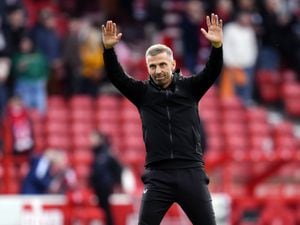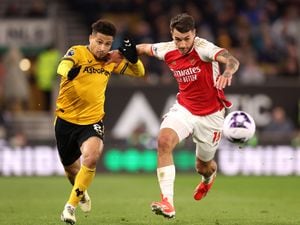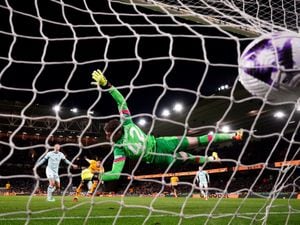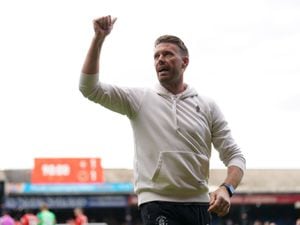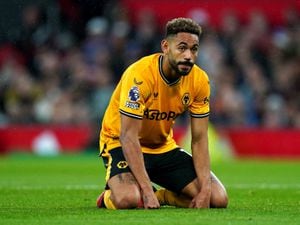Sky Sports' Johnny Phillips: 15 years on – and this Wolves side is different
Wolves fans will be heading up the M6 today in good spirits.
A trip to Old Trafford is always a daunting prospect but there is no reason to fear Manchester United.
Five games in, Nuno Espirito Santo’s side have already demonstrated they can live with the division’s best. It is a stark contrast to the Wolves side of 15 years ago, who were the first to play in the modern day incarnation of the Premier League.
After the opening five fixtures of the 2003/04 season the team was in the throes of an early season crisis, with Chelsea due at Molineux for the sixth game. On that occasion, Wolves’ players, management and supporters were genuinely wondering where a first win would come from, such was the torrid start they had made.
Two of the key figures from that era were back together ahead of today’s game. Manager Dave Jones and his captain Paul Butler joined fans at The Mount Hotel in Tettenhall, supporting a charity night. There were plenty of great memories to share about the First Division team that so memorably won promotion in Cardiff, with a 3-0 play-off final victory over Sheffield United in May 2003.
But Wolves entered the following season with a mix of ageing players such as Paul Ince, Denis Irwin, Alex Rae and Butler himself, alongside youngsters with no top flight experience like Matt Murray, Lee Naylor, Kenny Miller and Joleon Lescott - who suffered a bad knee injury before a ball was kicked. The need for team strengthening was obvious to all.
Sitting down with the former skipper to chat about his only top flight season with Wolves, it was interesting to hear his thoughts on a campaign that began so badly.
“I only had a year left on my contract,” Butler recalls. “A week after we got promoted I sat down with Dave, I knew I’d been under pressure, but I was determined to come back as fit as I’d ever been. He said, ‘That’s what I want, but I will be signing players in the summer’. The calibre of player he mentioned, I thought I’d have my hands full trying to get into the team. But for some reason it never happened.
“I remember getting promoted with Sunderland with a record 105 points and that summer we went and signed Stefan Schwarz and Steve Bould – strong characters that gave you a lift for that first season to keep you in the league. We didn’t do that. No disrespect to the lads who came in before the deadline – I think we signed Oleg Luzhny and Steffen Iversen. Players like that didn’t improve the squad, it was just another number. The gaffer had to bring numbers in and he knew that.”
Those two free transfers were not the worst in a terrible summer of transfer business. Isaac Okoronkwo arrived from Shakhtar Donetsk, also on a free, alongside Silas, a Portuguese midfielder of considerably less calibre than the current crop of Iberian imports. The only additions that could in any way be classed as useful were Henri Camara and Jody Craddock.
Wolves walked into the opening fixture against Blackburn Rovers at Ewood Park with about as much hope as a gazelle wandering into a pride of lions. They were torn apart, a 5-1 defeat clearly reflecting the gulf between the sides. The following game, at Molineux, was no better. A 4-0 defeat to Charlton Athletic left the players and manager visibly shell-shocked. These were not the big beasts of the Premier League, it was the division’s makeweights who were running amok.
The third game of the season was at Old Trafford in midweek under the floodlights, with some of the crueller pundits wondering whether reigning champions Manchester United could get into double figures. When John O’Shea opened the scoring after 10 minutes that seemed a possibility, but to their immense credit the struggling Wolves players doubled down and escaped with no further damage.
Back at Molineux, a 0-0 draw in the fourth game of the season was cause for celebration given what had gone on before but there was nothing to smile about when a James Beattie brace sunk Wolves at Southampton two weeks later. Five games in - one point, one goal scored, 12 conceded. Which leads us to the visit of Chelsea on 20th September 2003.
“I think if we’d have won one out of the first five games we’d have been alright, but we didn’t,” Butler continues. “We were just all over the place, we didn’t know where we were! Chelsea at home and they’re bringing Crespo on for Gudjohnsen. Welcome to the Premier League. You didn’t know where the first win was going to be, it was so tough.”
Chelsea substitute Hernan Crespo scored the last two goals in a 5-0 rout which left Wolves rooted to the bottom after six games. To all objective observers the season had finished almost as soon as it had begun. It was not until the 8th game when Jones’s side finally recorded a victory, with a rare Colin Cameron header securing a 1-0 win at home to Manchester City. It was one of very few bright spots in a campaign that limped to a predictable relegation.
There will be no such mistakes this time around and Butler admits he would have loved a chance in this team. “Yeah, but I don’t know if I’d have got in, the way Coady is playing. Nuno has got the group believing and the belief - out of all the games they’ve played - was there in the Manchester City game. I was watching thinking, ‘What they’ve done to City, especially in the last couple of years, no-one has done that to City’ and that wasn’t a fluke. There’s more to come and Nuno will probably say that himself.”
Butler’s team of 15 years ago was very different but it is still held in high regard for winning promotion despite the anti-climax that followed in the top flight. “The fans stuck with us because they knew it was tough and they knew we were playing with a Championship team,” he adds. After Sir Jack Hayward had finally realised his dream of taking the club back to the top flight, it was such a wasted opportunity that Jones and his players were never afforded a realistic chance to keep the club there.

